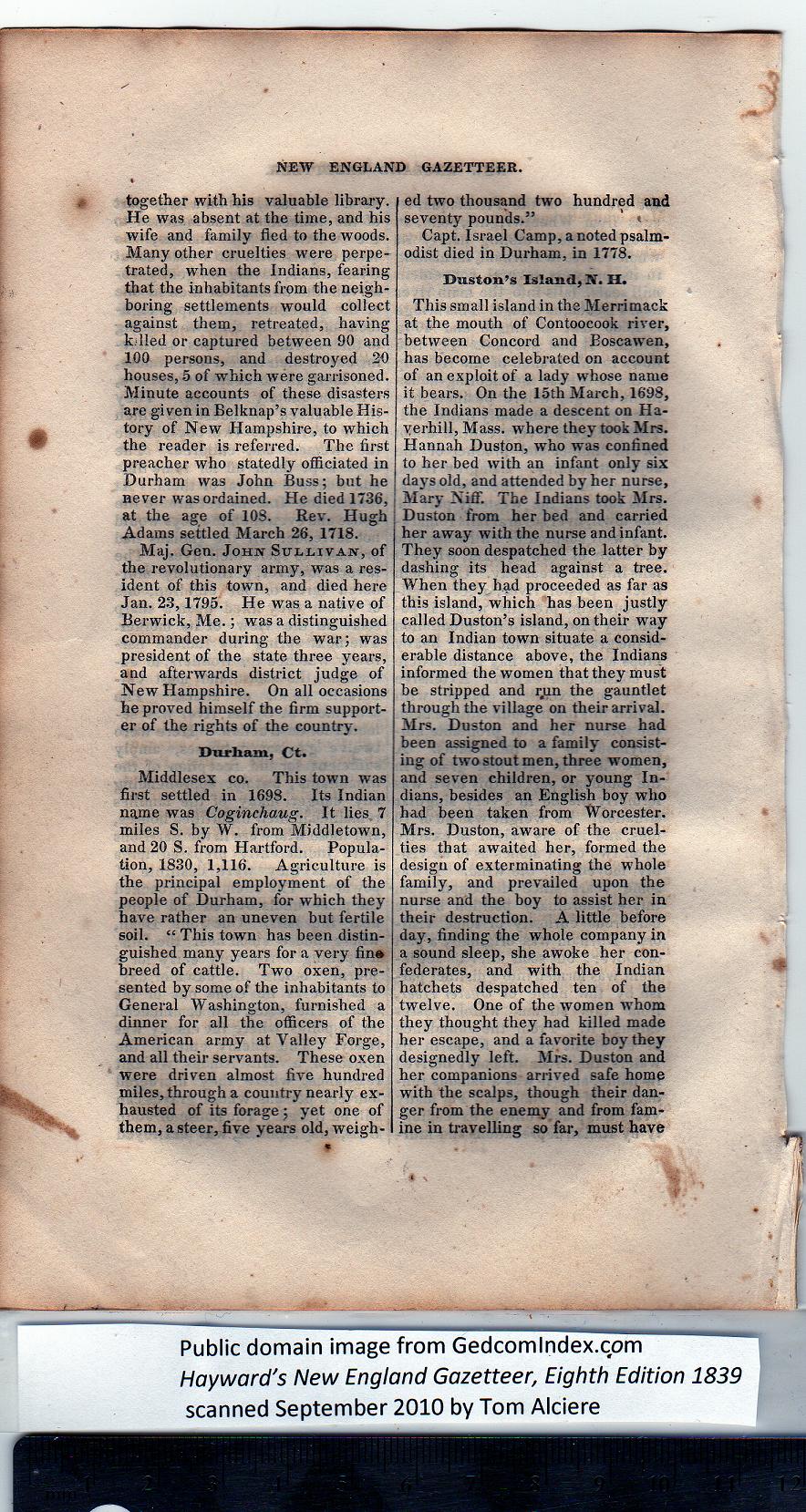|
together with his valuable library.
He was absent at the time, and his
wife and family fled to the woods.
Many other cruelties were perpe-
trated, when the Indians, fearing
that the inhabitants from the neigh-
boring settlements would collect
against them, retreated, having
k.lled or captured between 90 and
100 persons, and destroyed 20
houses, 5 of which were garrisoned.
Minute accounts of these disasters
are given in Belknap’s valuable His-
tory of New Hampshire, to which
the reader is referred. The first
preacher who statedly officiated in
Durham was John Buss; but he
never was ordained. He died 1736,
at the age of 108. Rev. Hugh
Adams settled March 26, 1718.
Maj. Gen. John Sullivan, of
the revolutionary army, was a res-
ident of this town, and died here
Jan. 23,1795. He was a native of
Berwick, Me.; was a distinguished
commander during the war; was
president of the state three years,
and afterwards district judge of
New Hampshire. On all occasions
he proved himself the firm support-
er of the rights of the country.
Durham, Ct.
Middlesex co. This town was
first settled in 1698. Its Indian
name was Coginchaug. It lies 7
miles S. by W. from Middletown,
and 20 S. from Hartford. Popula-
tion, 1830, 1,116. Agriculture is
the principal employment of the
people of Durham, for which they
have rather an uneven but fertile
soil. “ This town has been distin-
guished many years for a very fin*
breed of cattle. Two oxen, pre-
sented by some of the inhabitants to
General Washington, furnished a
dinner for all the officers of the
American army at Valley Forge,
and all their servants. These oxen
were driven almost five hundred
miles, through a country nearly ex-
hausted of its forage; yet one of
them, a steer, five years old, weigh- |
ed two thousand two hundred and
seventy pounds.” 1 '
Capt. Israel Camp, a noted psalm-
odist died in Durham, in 1778.
Duston’s Island, Bf. H.
This small island in the Merrimack
at the mouth of Contoocook river,
between Concord and Boscawen,
has become celebrated on account
of an exploit of a lady whose name
it bears. On the 15th March, 1698,
the Indians made a descent on Ha-
verhill, Mass. where they took Mrs.
Hannah Duston, who was confined
to her bed with an infant only six
days old, and attended by her nurse,
Mary Niff. The Indians took Mrs.
Duston from her bed and carried
her away with the nurse and infant.
They soon despatched the latter by
dashing its head against a tree.
When they had proceeded as far as
this island, which has been justly
called Duston’s island, on their way
to an Indian town situate a consid-
erable distance above, the Indians
informed the women thattheymust
be stripped and r4un the gauntlet
through the village on their arrival.
Mrs. Duston and her nurse had
been assigned to a family consist-
ing of two stout men, three women,
and seven children, or young In-
dians, besides an English boy who
had been taken from Worcester.
Mrs. Duston, aware of the cruel-
ties that awaited her, formed the
design of exterminating the whole
family, and prevailed upon the
nurse and the boy to assist her in
their destruction. A little before
day, finding the whole company in
a sound sleep, she awoke her con-
federates, and with the Indian
hatchets despatched ten of the
twelve. One of the women whom
they thought they had killed made
her escape, and a favorite boy they
designedly left. Mrs. Duston and
her companions arrived safe home
with the scalps, though their dan-
ger from the enemy and from fam-
ine in travelling so far, must have |
